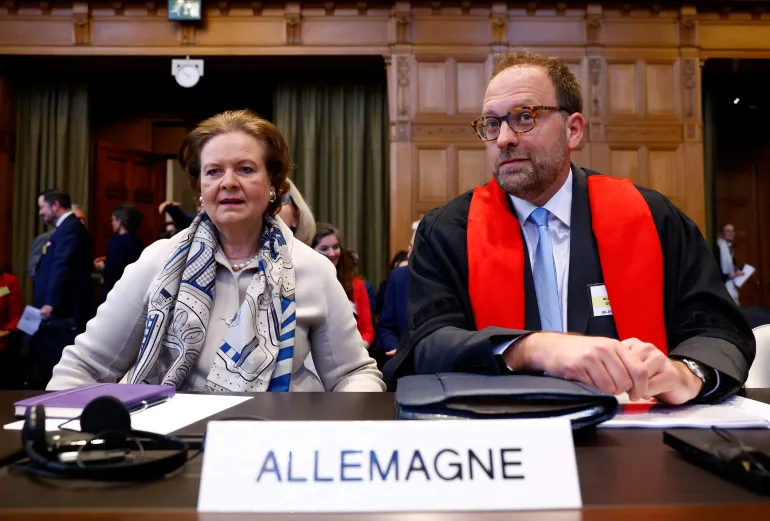The International Court of Justice (ICJ) has concluded its second and final day of hearings into Nicaragua’s case against Germany, which is accused of facilitating genocide in Gaza by supplying Israel with arms.
Germany argued in its defence that nearly all its military exports to Israel since October 7 have been “defensive in nature” and that it has upheld its responsibilities to both the Israeli and Palestinian people.
The lawyers questioned how Germany could be complicit in a case of genocide when the actual genocide committed allegedly by Israel has not been established yet.
Opening Germany’s defence at the ICJ in The Hague, German Foreign Office Legal Director-General, Tania von Uslar-Gleichen stated that Nicaragua’s accusations against it are “one-sided” and “fail to appreciate both the facts and the law.”
“Germany has always been an advocate for the promotion and strengthening of international humanitarian law and humanitarian principles,” Uslar-Gleichen said.
“This also guides our response to the conflict at stake here [in Gaza]. Germany is doing its utmost to live up to its responsibility vis-a-vis both the Israeli and Palestinian people. Germany firmly rejects Nicaragua’s accusations.”
Tania von Uslar-Gleichen
Germany’s legal representative, Christian Tams hit back at Nicaragua’s claims that Germany is violating the UN’s 1948 Genocide Convention by supplying Israel arms and “defunding” the UN agency for Palestinian refugees UNRWA.
He argued that Germany’s defence cooperation with Israel is based on a robust legal framework that ensures compliance with international law.
He said that Germany has demonstrated a commitment to supporting Palestinians from early on in the Gaza war, including by providing hundreds of millions of euros in humanitarian assistance to the occupied Palestinian territory.
Tams insisted that Germany has not defunded UNRWA, as Nicaragua claimed, but made a temporary decision not to approve further funds to the agency on January 27 after allegations against UNRWA members, which had no direct impact on the agency’s operations.
Germany has since resumed funding for UNRWA operations in the occupied West Bank, Jordan, and elsewhere.
Moreover, Samuel Wordsworth, counsel and advocate for Germany, argued that the ICJ cannot order any provisional measures against Germany because Nicaragua has not proven it even has jurisdiction in the case.
Anne Peters, another legal expert argued that Nicaragua’s case against Germany fails the “plausibility” test.
For the court to order provisional measures, Peters argued that the court would first have to find that there are plausible violations on the part of Israel — and then that there are plausible violations on the part of Germany.
“Here the court will especially have to find that there are plausible links between the conduct of Germany and the conduct of the absent third-party state, Israel, which Nicaragua has not done,” said Peters.
“This attempt to request provisional measures against one state by reference to the conduct of another state stretches the plausibility assessment to a breaking point. Nicaragua has said surprisingly little on the law and relied almost exclusively on speculation and inferences.”
Anne Peters
Germany Calls For Nicaragua’s Request’s Dismissal
Delivering the concluding remarks for the German delegation, Legal counsel Tania von Uslar-Gleichen emphasized that Nicaragua’s case “has no basis in law or fact.”
Uslar-Gleichen reiterated Germany’s stance that the court should dismiss Nicaragua’s request for provisional measures.
“Germany has neither violated the Geneva Convention nor international law, either directly or indirectly,” she averred.
“We stand by Israel’s right to security and to self-defence, while insisting upon its limits being scrupulously respected. We’ve done our utmost to use our political leverage to ensure respect for international humanitarian law. We continue to do our utmost to respect our own responsibilities deriving from international humanitarian law and the Genocide Convention.”
Tania von Uslar-Gleichen
It will likely take the ICJ years to issue a final ruling on Nicaragua’s case against Germany.
However, the court is expected to decide whether to order provisional measures sought by Nicaragua within weeks.




















